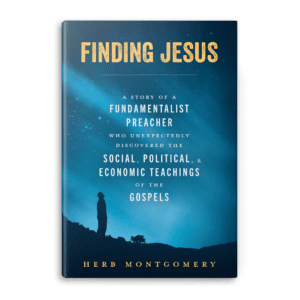
I’m not a fan of this evolution in the Jesus stories we have access to today. What it too often becomes is manipulative pressure for those who have suffered injustice or abuse to repeatedly forgive their abuses if the abuser expresses sorrow, whether they actually change or not. Some interpretations define the one seeking forgiveness as truly changing, but if there were true, the number of times needing for forgiveness would never reach “seventy times seven.”
Welcome Readers! Please subscribe to Social Jesus Here.
(Read this series from the beginning at Part 1 and Part 2.)
But if this was actually a call for creditors to practice Jubilee, repeatedly, seventy times seven, no matter how many times people became indebted, then this story takes on an economic dimension that requires social change. If the creditors who follow Jesus must forgive the concrete debts of their debtors, then before too long those creditors would be looking at the systemic causes of why folks were repeatedly being thrown into debt. As the saying goes, when you’re continually pulling people out of the water it doesn’t take long before one walks upstream to ask why those people are being thrown in the water to begin with.
What does this mean for us today?
First let’s say what it doesn’t mean. This parable doesn’t mean that we shouldn’t hold abusers accountable for the harm they inflict on others. Part of restorative justice is holding abusers accountable. Accountability is intrinsic to their own restoration and healing, too: it awakens and restores a sense of connection to their actions toward others. If there is an element of forgiveness involved, it refuses to sever the abuser from humanity, and the desire to hold them accountable comes not out of vengeance but out of a desire to see them reformed. Forgiveness should never be defined or interpreted as simply letting someone off the hook and pretending they did nothing wrong. Restoration and reparations must always be a part of the process of repairing harms committed for the life-giving well-being of all parties involved.
Yet this story still carries an economic element. How should Jesus followers relate to economic debt forgiveness? I heard many Christians voices over the last two years against student loan forgiveness. How would the Jesus of this week’s readings respond to the idea of students being forgiven the astronomical costs of becoming educated? How would he describe the predatory practices of the loan industry that takes advantage of those students. Consider the social location of those who have to seek student loans to gain an education. Considering these factors, certain Christians are grossly ignorant of how disconnected their religious worship of Jesus is from the values their Jesus taught and the themes of his gospel.
And this is just one example. In our modern, global capitalist system, indebtedness is how countries continue to colonize and enslave other countries, even “independent” countries. Sometimes this debt is connected to the drive to “develop” those countries so that they their resources can be more easily exploited by global corporations.
If we followed the economic truths of our story this week it would turn our present economic world upside down.
Maybe we could start with Christians simply forgiving the debts of their fellow Christians. There are also Christian ministries that raise funds and donations purely for the purpose of being able to pay off people’s medical debts. What a blessing to be able to say to someone they are set free from what they owed for something as vital as their own health care.
And what about debt at faith-based hospitals? Or education debt owed to Christian colleges and universities? What about the indebtedness that comes when folks fall on hard times? How could it change the world if Christians and Christian institutions simply chose to cancel the debts of other Jesus followers? I’m not suggesting this be where the practice should end, but it would be a great place for a global “year of the Lord’s” favor to begin.
 Herb’s new book, Finding Jesus: A story of a fundamentalist preacher who unexpectedly discovered the social, political, and economic teachings of the Gospels, is now available at Renewed Heart Ministries.
Herb’s new book, Finding Jesus: A story of a fundamentalist preacher who unexpectedly discovered the social, political, and economic teachings of the Gospels, is now available at Renewed Heart Ministries.













